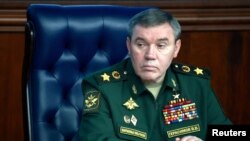Armed forces chief of staff General Valery Gerasimov has not appeared in public or on state TV since the aborted mutiny on Saturday when Wagner Group boss Yevgeny Prigozhin demanded Gerasimov be handed over. Nor has he been mentioned in a defence ministry press release since June 9.
Gerasimov, 67, is the commander of Russia's war in Ukraine, and the holder of one of Russia's three "nuclear briefcases" according to some Western military analysts.
Absent from view too is General Sergei Surovikin, nicknamed "General Armageddon" by the Russian press for his aggressive tactics in the Syrian conflict, who is deputy commander of Russian forces in Ukraine.
A New York Times report, based on a U.S. intelligence briefing, said on Tuesday he had advance knowledge of the mutiny and that Russian authorities were checking if he was complicit.
U.S. officials told Reuters that Surovikin had been in support of Prigozhin, but that Western intelligence did not know with certainty if he had helped the rebellion in any way.
The Russian-language version of the Moscow Times and one military blogger reported Surovikin's arrest, while some other military correspondents who command large followings in Russia said he and other senior officers were being questioned by the FSB security service to verify their loyalty.
Reuters could not determine whether Surovikin had been arrested or was being screened, along with others, for their reliability in a more standard exercise.
Rybar, an influential channel on the Telegram messaging application run by a former Russian defence ministry press officer, said a purge was underway.
He said the authorities were trying to weed out military personnel deemed to have shown "a lack of decisiveness" in putting down the mutiny amid some reports that parts of the armed forces appear to have done little to stop Wagner fighters in the initial stage of the rebellion.
"The armed insurgency by the Wagner private military company has become a pretext for a massive purge in the ranks of the Russian Armed Forces," Rybar said.
Such a move, if confirmed, could alter the way Russia wages its war in Ukraine — which it calls a "special military operation" — and cause turmoil in the ranks at a time when Moscow is trying to thwart a Ukrainian counteroffensive.
It could also cement or elevate the positions of other senior military and security figures regarded as loyal.
There was no official comment on what was going on from the defense ministry.












Forum